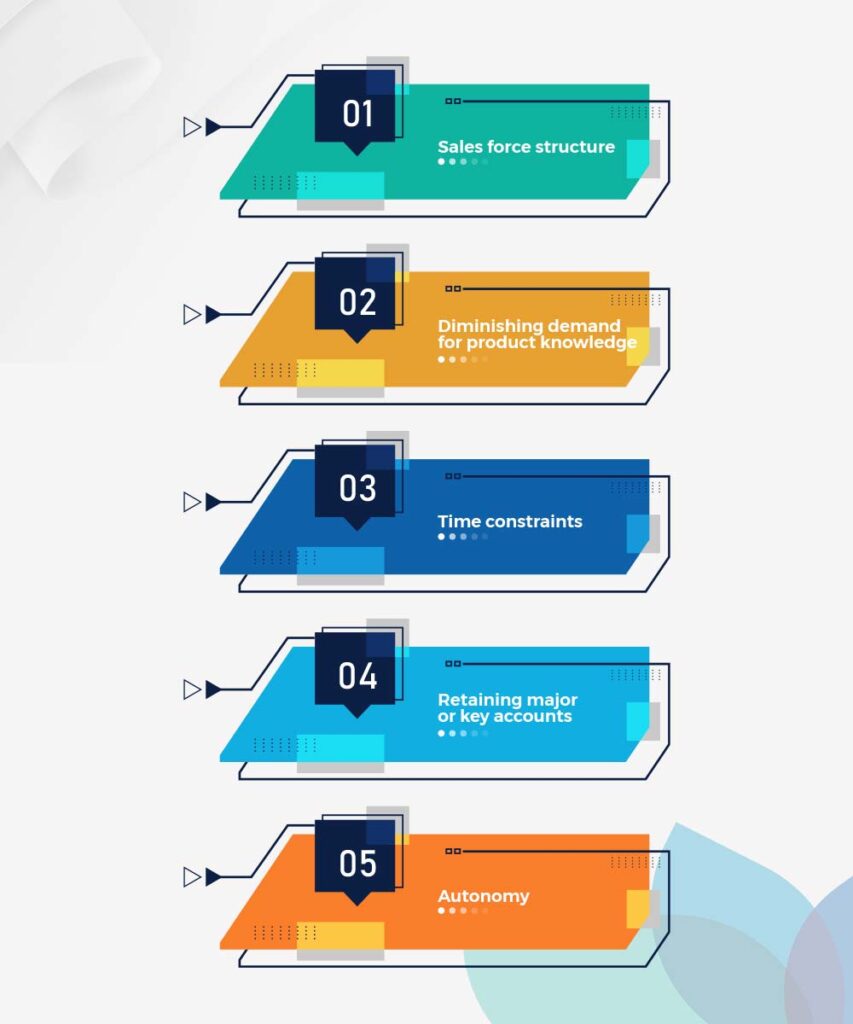Your sales organisation can define how contemporary and competitive your company will be in changing markets.
Customer buying behaviour has altered both within company processes and psychologically and companies need to be aware of how those changes will affect them as we start a new year. For many companies, the sales organisation are now operating with sales forces that are carrying excessive direct and indirect costs causing profit losses (without even talking about margin on products).
The currency of your sales organisation dictates how many challenges you will experience, the growth rates, and overall profitability. The marketplace has experienced what is arguably the most changes in living memory through a combination of internet, rapid innovation, the long tail of the recession, [and COVID], and increased competition. Even the small business down the block that traditionally was only affected locally, are now affected too.
There are some stand-out challenges for companies and the timeliness of their response will dictate the year/s ahead. Let’s look at those five areas that may affect your company in 2014 and beyond.
Contemporary Sales Organisation Revision # 1: Sales force structure
Salesforces have for a long time been structured around customer bases and geographical requirements. They were the direct generators or influencers of revenue and the manager’s focus was keeping them in the field, on the route, and meeting customers. Today’s market demands fewer salespeople in the field and more located inside. For the sales managers, this presents many challenges as they are inexperienced in gaining value from inside sales teams and hold a core belief that the old model will always apply. Inside sales are no longer just customer service nor telemarketers.
Many products have become transactional or commodities. They are repeat purchases with an emphasis on supply chain excellence. Customers want to order with the least amount of cost involved in their acquisitions. That does not mean price point pressure. It means very little human interaction to get functional ordering completed. The field salesperson becomes a barrier to that process as the customer sees no value in their involvement; they believe it can be done electronically. They do not want one central contact only with a company regarding their purchases, they want a team of people to deal with according to the specific problem. The field salesperson or route seller is becoming redundant as more and more products shift to transactional or commodities.
Companies not transitioning or transitioning quickly enough are paying excessive costs unnecessarily. They will also be recognized by their customers as being out of sync with the market as other suppliers (not necessarily competitors) alter their customer service-ordering models.
In many companies we review, we find an excess cost structure. As an example, I reviewed a company that had traded to misalignment with the market and was carrying a $480,000 (.5% of revenue) excess cost structure. They believed it was a competitive advantage having the sellers but it was in fact a disadvantage. They were losing market share.
Careful review and a project plan are required before making any transitions as we saw the rise of companies in 2013 doing insufficient preparation and transformation work to ensure success with the new model.
Contemporary Sales Organisation Revision # 2: Diminishing demand for product knowledge.
Contrary to what most people have said for many years, the need for product knowledge in salespeople is diminishing. Customers have enormous resources of information available to them and no longer seek salespeople as product knowledge resources. They have product information on websites with enormous depth and support readily available to answer those questions; without someone taking up excessive time in their office.
Today customers often have selected products before they speak with sellers. They look for the seller to add value in other ways. That value can appear in creating business cases, solutions to specific challenges with technical application know-how. Yes, product knowledge such as features and benefits is defined separately to technical application know-how.
This affects the structure of the sales force, the access to information, their training and education of sellers, their ability to complete technical application-related tasks. As the number of sellers reduces the increase in the technical application is vital. Sellers must excel at technical applications.
If there is no technical application to your product, go back to point one of this article. The salesperson in this capacity has become a far more trained and skilled individual.
Contemporary Sales Organisation Revision # 3: Time constraints
Salespeople are often complaining about their lack of time however, the customers have even less. The time of a supplier is very limited and they need to have productive, focused, and conduct only pertinent meetings with suppliers. The meeting must add value to their time more than what they can already gain from their own endeavours or through online communication mediums (email, websites, e-catalogues, etc.). Salespeople who are used to taking in a ‘special’ or dropping something off are considered a waste of time to meet with suppliers.
If they do not add value and progress the supplier forward in a business sense, the meeting time will not be booked again in the future or they will be relegated to a lower-ranked non-decision making person.
Not in an isolated incident, I was the observer on a customer call with a client last year. The salesperson was their ‘best’ seller. The salesperson used old-style selling practices and at the end of the meeting, the customers advised “I have to go I have a meeting with a supplier regarding xy and z. Good to catch up with you”. The problem was the company sold xy and z.
The diminished time affects the training of sellers. They must be fully proficient in business case selling and modern business account management. Referencing to relationships is now considered the ‘norm’ and insufficient to retain accounts; or their job. Customers want hard evidence of value and reasons to continue purchasing from the company.
Contemporary Sales Organisation Revision # 4: Retaining major or key accounts
For years, there was a person nominated at the top of the sales force hierarchy known as the key account manager or major account manager. That person was a long-standing employee that had created relationships over time providing them ease of access to decision-makers. The longevity of that association was seen as a talent.
Those same skills are now considered high risk and the risk is being managed through a more collaborative approach to major accounts. The need for more people involved across the business and less emphasis on one individual. A group of people that add value at various layers with decision-makers. A group that is synchronised and managed to a strategic customer plan to ensure growth and full understanding of the customers’ business and their direction, needs, and demands.
The collaborative approach lessens the emphasis on relationships and increases the emphasis on the business case and partnering with customers. It is a whole of business approach from both sides; customer and supplier. It requires considerable documentation and project management skills to enable it to be truly effective. Each customer may have a different combination of people in its collaborative team depending on the maturity and demands within their account.
Companies are slow to adopt this approach as they struggle with the point below.
Contemporary Sales Organisation Revision # 5: Autonomy
This is one of the last bastions of sales where people demand autonomy. Managers promote it as it abdicates their responsibility. Salespeople demand it as it gives them freedom with little accountability. Autonomy was originally created for top sellers who were just outright difficult to manage, but in the real world, there are very few top sellers. Or by managers who just did not know how to manage people. Autonomy is about doing things their own way – when they want to and how they want to. Trusting they had the skills and talent to just get it right.
Contemporary managers know how disruptive autonomy can be to a culture. It immediately segments people with the understanding that if you behave this way, you no longer have to comply with the sales operational systems and processes. CRM is often a great example of this. Autonomy is the death of a company brand as there is no consistency in what is communicated in the market and no consistent current and best practices selling process applied. Most sales teams lose 67% more opportunities when managed under the guise of autonomy. Most of all it is the most unproductive method of running a sales team. It throws best practice, latest standards, repeatable process, and scalability out the window.
National Sales Managers are now de-hiring those that demand autonomy due to the cultural issues, the untrainable attitude, and the inability to follow sales operations requirements. They build their sales organisation around mid-range sellers and provide the necessary support for them to excel. That brings about consistency, reliability, and scalability and importantly – over sales goal delivery.
For autonomous sellers and managers, the other major shift is the accounts are also changing their demands which goes to the other four points outlined above.
What action to take
As the year kicks off, CEOs need to understand with deep knowledge the changes they need to be making to continue to transition their sales organisation to be highly competitive, cost-effective, and realise the required outputs. They need to have confidence based on facts that sales managers are operating with contemporary methodology and not legacies from the past. This is achieved through our sales improvement reviews providing you with not only a report of the issues, but thorough action plans to improve your company. A working document to guide both the CEO and Sales Manager through the project.
If you would like to discuss your sales organisation’s currency and understand the transitions required please do not hesitate to contact our office.
If you found this article helpful, follow us on LinkedIn or subscribe to Our Insights on the right-hand column of this page, to make sure you don’t miss new posts.
You may also be interested in these articles:
- Sales Management Challenges For Growth
- How CEOs Can Future Proof Sales and Exceed Sales Goals Consistently
- Ascertaining the Real Value of an Effective Sales Manager
- How CEOs Lead Sales Teams in Growing Companies
© 2014 Sales Focus Advisory. All rights reserved.

